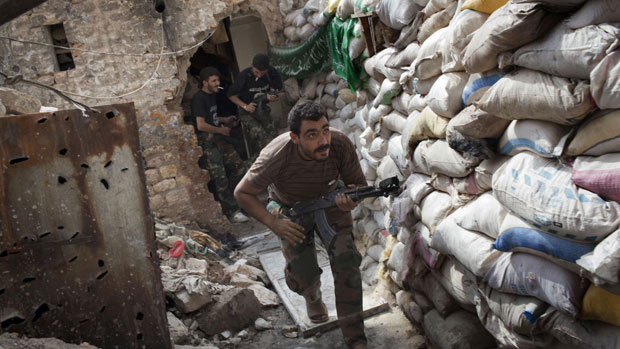PM considered plan to train and arm 100,000 Syrian rebels
Secret plan came from army top brass: create rebel army so Syrians could defeat Assad themselves

A free daily email with the biggest news stories of the day – and the best features from TheWeek.com
You are now subscribed
Your newsletter sign-up was successful
David Cameron considered arming and training a 100,000-strong army of Syrian rebels to defeat president Bashar al-Assad, it has emerged. The secret plan was proposed two years ago but rejected as being too risky, says the BBC’s Newsnight.
The initiative was the brainchild of General Sir David Richards, now Lord Richards, at the time the UK’s most senior military officer. It was seriously considered by the Prime Minister, the National Security Council and US officials.
Richards’s “extract, equip, train” plan involved an international coalition turning the rebels into a concerted fighting force at camps set up in Turkey and Jordan. He intended to vet the participants to ensure they were moderates.
The Week
Escape your echo chamber. Get the facts behind the news, plus analysis from multiple perspectives.

Sign up for The Week's Free Newsletters
From our morning news briefing to a weekly Good News Newsletter, get the best of The Week delivered directly to your inbox.
From our morning news briefing to a weekly Good News Newsletter, get the best of The Week delivered directly to your inbox.
It would take a year, Richards believed. Then, the troops would return to Syria for a “shock and awe” campaign with Syrian fighters on the ground and support from fighter jets supplied by Gulf states and the West.
During the training period, there would be time for an alternative Syrian government to be formed in exile.
Monzer Akbik, from the opposition group the Syrian National Coalition, said: “A huge opportunity was missed and that opportunity could have saved tens of thousands of lives actually and could have saved also a huge humanitarian catastrophe.
“The international community did not intervene to prevent those crimes and at the same time it did not actively support the moderate elements on the ground.”
A free daily email with the biggest news stories of the day – and the best features from TheWeek.com
Professor Michael Clarke of the Royal United Services Institute told the BBC that it was too late now for a plan which would have been “dangerous”. He said: “We have missed the opportunity to train an anti-Assad force that would have real influence in Syria when he is removed, as he will be.
“I think there was an opportunity two or three years ago to have become involved in a reasonably positive way, but it was dangerous and swimming against the broader tide of history… and the costs and the uncertainties were very high.”
In three years of civil war in Syria, tens of thousands have died and millions more have been displaced.
-
 6 of the world’s most accessible destinations
6 of the world’s most accessible destinationsThe Week Recommends Experience all of Berlin, Singapore and Sydney
-
 How the FCC’s ‘equal time’ rule works
How the FCC’s ‘equal time’ rule worksIn the Spotlight The law is at the heart of the Colbert-CBS conflict
-
 What is the endgame in the DHS shutdown?
What is the endgame in the DHS shutdown?Today’s Big Question Democrats want to rein in ICE’s immigration crackdown
-
 Epstein files topple law CEO, roil UK government
Epstein files topple law CEO, roil UK governmentSpeed Read Peter Mandelson, Britain’s former ambassador to the US, is caught up in the scandal
-
 Iran and US prepare to meet after skirmishes
Iran and US prepare to meet after skirmishesSpeed Read The incident comes amid heightened tensions in the Middle East
-
 Israel retrieves final hostage’s body from Gaza
Israel retrieves final hostage’s body from GazaSpeed Read The 24-year-old police officer was killed during the initial Hamas attack
-
 China’s Xi targets top general in growing purge
China’s Xi targets top general in growing purgeSpeed Read Zhang Youxia is being investigated over ‘grave violations’ of the law
-
 Panama and Canada are negotiating over a crucial copper mine
Panama and Canada are negotiating over a crucial copper mineIn the Spotlight Panama is set to make a final decision on the mine this summer
-
 Why Greenland’s natural resources are nearly impossible to mine
Why Greenland’s natural resources are nearly impossible to mineThe Explainer The country’s natural landscape makes the task extremely difficult
-
 Iran cuts internet as protests escalate
Iran cuts internet as protests escalateSpeed Reada Government buildings across the country have been set on fire
-
 US nabs ‘shadow’ tanker claimed by Russia
US nabs ‘shadow’ tanker claimed by RussiaSpeed Read The ship was one of two vessels seized by the US military